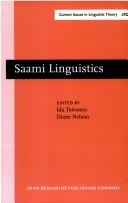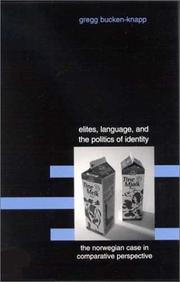| Listing 1 - 2 of 2 |
Sort by
|

ISBN: 128215267X 9786612152672 9027292027 9789027292025 9789027248039 9027248036 9781282152670 6612152672 Year: 2007 Volume: 288 Publisher: Amsterdam Philadelphia John Benjamins Pub.
Abstract | Keywords | Export | Availability | Bookmark
 Loading...
Loading...Choose an application
- Reference Manager
- EndNote
- RefWorks (Direct export to RefWorks)
The papers in this volume describe and analyze an array of intriguing linguistic phenomena as they occur in the Saami languages, ranging from etymological nativization of loanwords to the formation of deadjectival and denominal verbs. Saami displays a number of characteristics that are unusual from a cross-linguistic perspective, including partial agreement on verbs, a three-way quantity distinction in consonants and spectacular consonant gradation. The eight papers presented here approach these and other issues from diverse theoretical perspectives in morphology, phonology, and syntax. The volume includes an extensive research bibliography which will be helpful for anyone interested in Saami linguistics.
Sami language. --- Lapp language --- Lappish language --- Saam language --- Saami language --- Finnic languages --- Lapon (Langue)

ISBN: 0791487202 1417531215 9781417531219 0791456552 9780791456552 0791456560 9780791456569 9780791487204 Year: 2003 Publisher: Albany State University of New York Press
Abstract | Keywords | Export | Availability | Bookmark
 Loading...
Loading...Choose an application
- Reference Manager
- EndNote
- RefWorks (Direct export to RefWorks)
"Why and when do linguistic cleavages within a nation become politicized? Using Norway - where language has played a particularly silent role in the nation's history - as a case study, Gregg Bucken-Knapp explores these questions and challenges the notion that the politicization of language conflict is a response to language problems. He shows that political elites often view language conflict as a political opportunity, placing it on the policy agenda as an effective mobilizing tool to serve their own nonlinguistic political ends. Although language-oriented interest groups may fight to achieve desired language policies, they are generally unsuccessful when their preferences clash with the broader objectives of political elites. This book focuses on understanding just how language policies emerge."--Jacket
Nationalism --- Sami language. --- Norwegian language --- Norwegian language (Nynorsk) --- Consciousness, National --- Identity, National --- National consciousness --- National identity --- International relations --- Patriotism --- Political science --- Autonomy and independence movements --- Internationalism --- Political messianism --- Lapp language --- Lappish language --- Saam language --- Saami language --- Finnic languages --- Landsmaal --- Landsmål --- Neo-Norwegian language --- New Norwegian language --- Norwegian language (Landsmaal) --- Norwegian language (Landsmål) --- Norwegian Nynorsk language --- Nynorsk --- Scandinavian languages --- Bokmål --- Dano-Norwegian language --- Norwegian language (Bokmål) --- Norwegian language (Riksmål) --- Riksmål --- History. --- Social aspects --- History
| Listing 1 - 2 of 2 |
Sort by
|

 Search
Search Feedback
Feedback About UniCat
About UniCat  Help
Help News
News